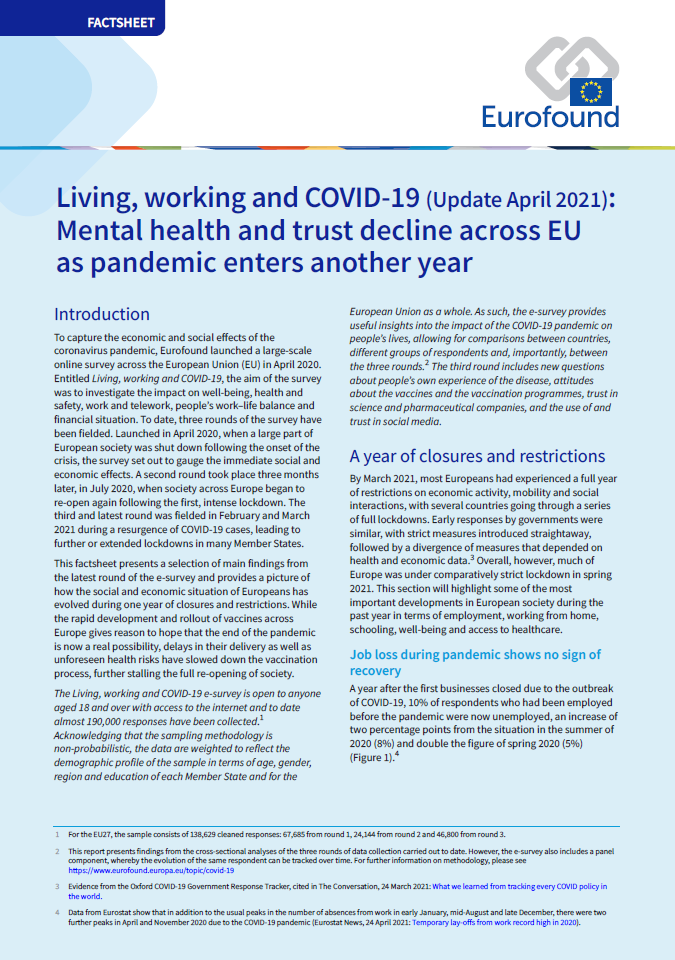
Tretji krog spletne raziskave Eurofounda, ki je potekal februarja in marca 2021, je osvetlil socialni in gospodarski položaj ljudi v Evropi po skoraj celem letu življenja z omejitvami zaradi covida-19. To poročilo analizira ključne ugotovitve ter spremlja razvoje dogodkov in trende v 27 državah članicah EU od začetka raziskave aprila 2020. Opredeljuje vprašanja, ki so se pojavila med pandemijo, kot so večja negotovost zaposlitve zaradi nevarnosti izgube delovnih mest, zmanjšanje ravni duševnega dobrega počutja, zmanjšanje enakosti spolov, kjer je bil pred tem dosežen napredek, padec ravni zaupanja v institucije, poslabšanje ravnovesja med poklicnim in zasebnim življenjem ter povečanje nezaupanja v cepljenje. Rezultati raziskave poudarjajo potrebo po celostnem pristopu za podporo vsem skupinam, ki jih je kriza močno prizadela, da se prepreči njihovo nadaljnje zaostajanje.
Key findings
Duševno dobro počutje je od začetka pandemije pred več kot enim letom doseglo najnižjo raven v vseh starostnih skupinah. To je zlasti izrazito med mladimi in tistimi, ki so izgubili službo.
Obstoječe neenakosti se povečujejo zaradi nesorazmernega učinka pandemije na ranljive skupine. Ugotovitve kažejo, da se je delež tistih, ki težko shajajo iz meseca v mesec, znatno povečal pri osebah, ki so že bile v negotovem položaju.
Zadovoljstvo državljanov s podpornimi ukrepi, povezanimi s krizo, se je izrazito zmanjšalo, pri čemer jih zdaj le 12 % meni, da so podporni ukrepi pravični, medtem ko je bilo poleti 2020 takega mnenja 22 % vprašanih. Tudi odstotek tistih, po mnenju katerih je bilo pridobivanje podpore dostopno in učinkovito, se je s 16 % poleti 2020 zmanjšal na 10 % spomladi 2021. Skoraj vsak deseti anketiranec, ki je oddal zahtevek za finančno podporo, je bil zavrnjen.
Močno je upadlo zaupanje v institucije, zlasti zaupanje v nacionalne vlade, ki se je s 4,6 poleti 2020 zmanjšalo na 3,9 spomladi 2021. Zaupanje v nacionalne vlade v vseh državah članicah je bilo nižje od ravni, zabeleženih na začetku pandemije. Zmanjšalo se je tudi zaupanje v EU, vendar je še vedno večje kot zaupanje v nacionalne vlade.
Več kot četrtina ljudi, ki živijo v Evropi, navaja nezaupanje v cepivo proti covidu-19, pri čemer je nezaupljivih več moških (29 %) kot žensk (25 %). Nezaupanje v cepljenje je močno povezano tudi z nizko stopnjo zaupanja in uporabo družbenih medijev, saj države, ki beležijo nizko stopnjo zaupanja v vlado, beležijo višjo stopnjo nezaupanja v cepljenje.
The report contains the following lists of tables and figures. The corresponding data for the tables and figures is available as an Excel download (328KB .xlsx).
List of tables
- Table 1: Location of work and average hours worked during the pandemic, EU27 (%)
- Table 2: Proportion of parents declaring they are too tired after work to do household jobs, EU27 (%)
- Table 3: Proportion of respondents reporting having negative feelings by age and gender, EU27 (%)
- Table 4: Request for support by employment status, EU27 (%)
- Table 5: Proportion of financially fragile respondents by employment status, EU27 (%)
- Table 6: Proportion of respondents reporting difficulties making ends meet by employment status, EU27 (%)
- Table 7: Proportion of respondents reporting arrears by group, EU27 (%)
- Table 8: Trust in the EU by sociodemographic group (mean scores), EU27 (%)
- Table 9: Trust in the national government and the EU by financial support (mean scores), EU27 (%)
List of figures
- Figure 1: Respondents who lost their job (of those who were employed before the pandemic) by country, EU27 (%)
- Figure 2: Preference to work from home post-pandemic, EU27 (%)
- Figure 3: Proportion of parents declaring they would like more online schooling for their children, even when the pandemic is over, EU27 (%)
- Figure 4: Risk of depression by age group and survey round, EU27 (%)
- Figure 5: Unmet need for healthcare during the pandemic by country, EU27 (%)
- Figure 6: Unmet need for healthcare by type of healthcare, spring 2021, EU27 (%)
- Figure 7: Requests for different types of support measures, summer 2020 and spring 2021, EU27 (%)
- Figure 8: Views about pandemic support measures, summer 2020 and spring 2021, EU27 (%)
- Figure 9: Views about pandemic support measures by country, spring 2021, EU27 (%)
- Figure 10: Proportion of respondents reporting difficulties making ends meet by country, EU27 (%)
- Figure 11: Pessimism about financial situation by economic situation, EU27 (%)
- Figure 12: Proportion of respondents stating that their financial situation will get worse, EU27 (%)
- Figure 13: Trust in institutions (mean scores), EU27 (%)
- Figure 14: Trust in the EU by country (mean scores), EU27 (%)
- Figure 15: Trust in national governments by country and survey round, EU27 (%)
- Figure 16: Stated intention to take vaccine by country, EU27 (%)
- Figure 17: Sociodemographic characteristics of people with vaccine hesitancy in Europe, EU27 (%)
- Figure 18: Reasons for vaccine hesitancy, EU27 (%)
- Figure 19: Trust in institutions among people who are vaccine hesitant and non-hesitant, EU27 (%)
- Figure 20: Vaccination hesitancy before and after 11 March 2021, EU27 (%)
- Infographic: Living, working and COVID-19
